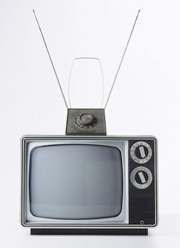Television: Difference between revisions
Jump to navigation
Jump to search
imported>Russell Potter (section commented out; see Talk page) |
imported>Russell Potter (Revised fresh start) |
||
| Line 1: | Line 1: | ||
[[Image:Television.JPG|right|thumb|A 1970's-era television receiver, with "rabbit ears" antennae for receiving VHF transmissions, and a loop for UHF signals]] | [[Image:Television.JPG|right|thumb|A 1970's-era television receiver, with "rabbit ears" antennae for receiving VHF transmissions, and a loop for UHF signals]] | ||
'''Television''' (also, informally, "TV" and "telly") is the electronic transmission of moving pictures. | '''Television''' (also, informally, "TV" and "telly") is the electronic transmission of moving pictures. The word "television" literally means "far sight"; it was formed by combining the Greek word ''{{polytonic|τῆλε}}'' ("tele", or "far") with the Latin word ''visio-n'' ("sight", from ''video, vis-'' to see) — this coinage follows the pattern of [[telegraph]] ("far writer") and [[telephone]] ("far talker"). A parallel constuction may be found in German, where it is known as "fernsehen" or "far-seer." In general usage, the meaning of "television" has been expanded to also refer to receivers, and to video in conventional broadcast as well as [[Cable television|cable]] and satellite signals.The word is also used to describe, in broad terms, the ''content'' of television programming generally. | ||
== | |||
Revision as of 07:37, 19 June 2007
Television (also, informally, "TV" and "telly") is the electronic transmission of moving pictures. The word "television" literally means "far sight"; it was formed by combining the Greek word τῆλε ("tele", or "far") with the Latin word visio-n ("sight", from video, vis- to see) — this coinage follows the pattern of telegraph ("far writer") and telephone ("far talker"). A parallel constuction may be found in German, where it is known as "fernsehen" or "far-seer." In general usage, the meaning of "television" has been expanded to also refer to receivers, and to video in conventional broadcast as well as cable and satellite signals.The word is also used to describe, in broad terms, the content of television programming generally.
==
